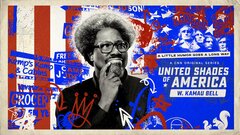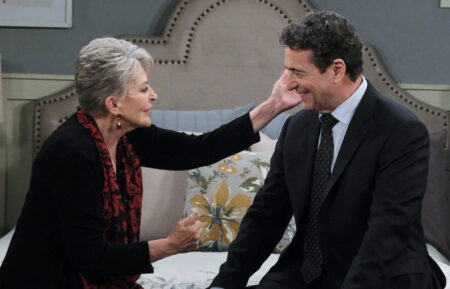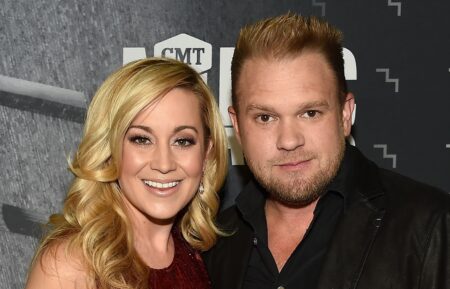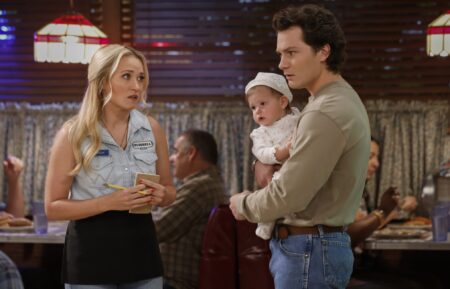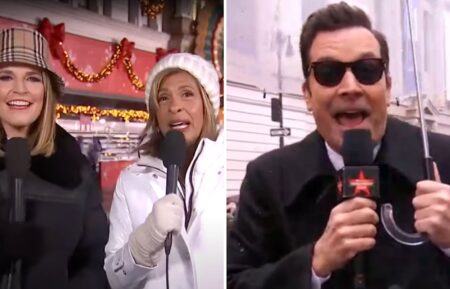W. Kamau Bell on Hanging Out With the KKK and His First Comedy Special
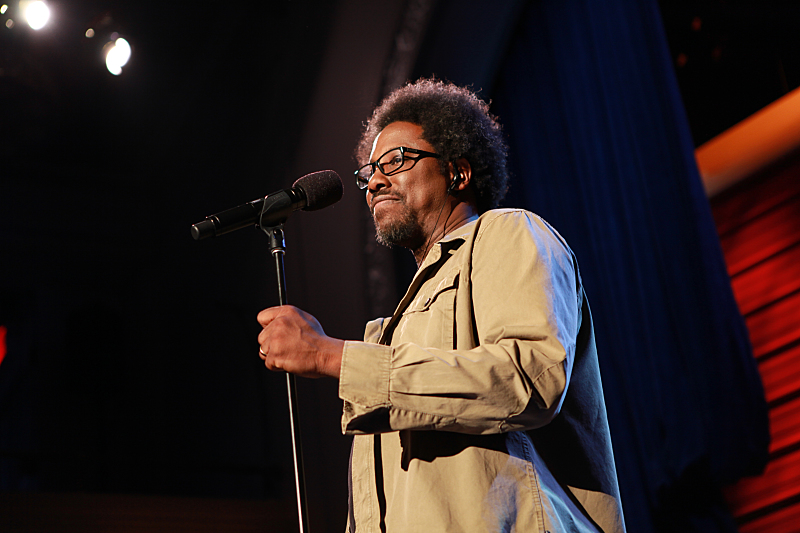
In 2012, W. Kamau Bell was a veteran stand-up comedian in the Bay Area who had provocative and hilarious takes on race and politics. Then he was “discovered” by Chris Rock, and the two of them sold FX a talk show fronted by the relatively-unknown comic. The result was Totally Biased With W. Kamau Bell, a weekly topical show that pushed the boundaries of the discussion on race years before Trevor Noah and Larry Wilmore got their own late night shows.
With the show’s success, however, came a fatal mistake on the part of FX: they decided to make it a nightly show and put it on their new, end-of-the-cable-dial network, FXX. It didn’t take long for the show to get cancelled.
Since the show’s 2013 demise, Kamau has kept busy with tours, opinion pieces, cable pundit shows, and other places where he can ply his point of view. Now he’s back with a new series on CNN, United Shades of America, where he spends time with segments of the country that people know little about beyond certain stereotypes. In the first episode, which debuted on April 24, he visited with various factions of the Ku Klux Klan and actually witnessed a cross burning.
Kamau also stars in his first comedy special, W. Kamau Bell: Semi-Prominent Negro, on Showtime, which debuts on Friday, April 29. Directed by Morgan Spurlock, Kamau explores being part of a multi-racial family, white liberal guilt, the presidential race and other topics. Here he discusses the special and hanging with the KKK, and what he learned from his short career as a basic cable late-night host.
RELATED: Charles Barkley Goes on an Anti-CNN Rant During TNT’s NBA Coverage
The first thing you said when you came on stage during your special was, “Showtime asked me if they could film my first comedy special…” I’m like, “He hasn’t had a comedy special yet?”
[Laughs] Yeah, I have two comedy CDs that are special to me. All my comedy stuff, I was always in this weird position where I was either too small for the thing or then, in a weird position, where, in a way, too big for one thing but not big enough for the other thing. I was just always, sort of, like … This special exists because I, and then Morgan [Spurlock], of course, went out to go get it. Nobody showed up and said, “We have to give you a special.”
Considering you had your own FX late night show, how is it not happening until now?
The special’s called Semi-Prominent Negro and I think that’s exactly how I felt since Totally Biased was on the air. This weird status of not totally being the No. 1 guy or the No. 2 guy but sort of being in the mix a little bit.
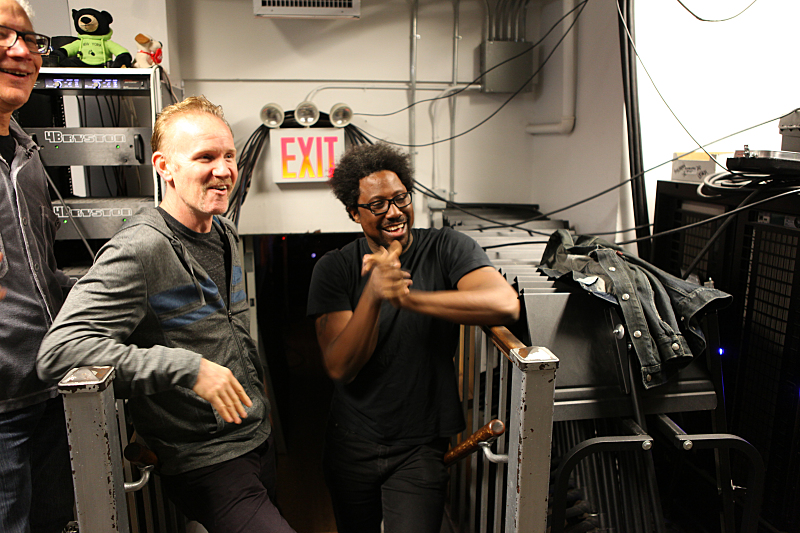
Morgan Spurlock and W. Kamau Bell
The idea was to have the small theater and the same intimate vibe that you had with Totally Biased?
Yeah, whenever we talked about the audience of Totally Biased, I would literally be able to touch them if I wanted to. And sometimes I did. The same thing with this. I said, when we set it up, I was like, “I want to be able to walk out into the crowd if I need to.” And I did.
I feel like the people who are supportive of mine, who like the work I do, we’re still in a small, it’s artisanal. It’s like hand-picked fans, locally-sourced fans.These are dedicated people. A lot of them don’t even like comedy in general but they like me. I feel like it’s very important to maintain an intimate connection with those people and, basically, just reward them for showing up. “You’re here and I’m here, let’s hug, if we want to.” It’s really important because I, for a long time, didn’t really have a fan base. I built it up in the Bay Area slowly, so the people there have liked me for 10 or 15 years. These are people who raised me, so I want to maintain that as I move through my career with people all over the country.
What did the experience of Totally Biased teach you about the business in general and how to translate to what you’re doing with your career?
For one, I think that I wouldn’t be on the phone with you right now, if not for John Landgraf and the people at FX. I know a lot of the work I put in there was some of the best work that I’ll ever do in my career. I’m very proud of my work, I’m very proud of the fact that that show introduced a lot of people to comics they had never heard of before. I really do know that I’m going to be standing on that show for the rest of my life. I think, in the cancellation of it, it got a lot more acclaim than when it was living. Very quickly, once it got cancelled all this love poured out for the show that I think never would have shown up if we had just limped along.
I’ve learned, since I’ve been away from the show, that the work still resonates with people. So much so, that some people I run into go, “When is that show coming back?” I think that it’s really connected a lot of people to comedy where they hadn’t been connected before because we wore our hearts on our sleeves on that show.
The thing I also learned is that you have to be really specific about asking for what you want and fighting for what you want. And I have to be willing to walk away. The whole thing was such a whirlwind experience that this new thing is not a whirlwind experience. I’m very focused on what I want, and I’m better at asking for it, and better at saying no, and also knowing that, if we get to Season 2 of United Shades of America there’s even more stuff that I know that I want. Money’s a part of that, but the other part is just control of your voice. That’s more important to me than the money, totally, honestly, and I can prove that because I live in Berkeley, I don’t live in L.A. or New York.
At the end of the day, it’s about making sure that when I come home, that I’m happy to see my family and they’re happy to see me. They’re not like, “Oh, no, the assh–e’s here.” During Totally Biased, there was times where, “Uh-oh, the assh–e is here,” because it was so much weight on my shoulders and I really, it was like wrestling a bear every day and getting your ass kicked many of those days.
RELATED: John Oliver gets Martin Sheen to Star in a Celebratory Version of CNN’s Doomsday Video
Was going to an every day schedule the toughest part of that?
Yeah, I think we had just started to figure out weekly, and then we went to every day, and it just completely upset the applecart in a way that we were, it’s like the train was moving out of the station at the same time we were building the train.
A lot of us has never worked on daily shows before but I think if I had been a better leader, and a better everything, the show might have had a better chance. Also, I was working with a lot of friends, and it’s just hard when you work with your friends and then there’s pressure. When stress happens, it makes people react in a way that they wouldn’t react in a way with people they weren’t friends with before this all happened. Sometimes it makes people pull together, and a lot of times it makes people hate the guy in charge. For right or for wrong it made an extra level and that made it more difficult.
Do they like you again now, at least?
Some friendships have become way, way deeper, and some friendships have not survived. Luckily, I’ve lived long enough to know that they will either come back around or they don’t, and you just have to make sure you’re good with the people that you need to be good with in your life. It’s funny, once you have kids, you realize, “I can’t really hope everybody likes me. I just have to make sure these people like me.”
I certainly miss some people that I was friends with, and maybe they’ll come back around, but also, this morning my oldest daughter said, “Dadda, pick me up from school today.” I was like, “Oh, good, she likes me.” [Laughs] “This is working.”
A lot of people define friends as a lot of things. I define it as a very small group of people, and none of those people who were in my friends group, those people all saw the stress on my face and survived that time, and were like, “Yeah, we’re still here for you.”
Now that you see Samantha Bee and John Oliver doing weekly topical shows, do you wish you were back in that game?
No, I don’t think that I would, unless they wanted to tape it in Berkeley. There’s nothing about that game that makes me go, “I want to get back in that.” I think that, if anything, I wish I had gone to Jon Stewart University before I was in that game. When you see Samantha Bee and John Oliver, who, first of all, they’re doing the Lord’s work, they earned the right to work for Stewart and then they had the opportunity for such a long time, that they learned those skills. They’ve got PhDs in talking to TV.
I was learning it for the first time; I was that dude, and I think that’s all very clear. I sometimes wish, if I could do it all over again, when they offered me Totally Biased, I’d go, “Can I just be an intern at The Daily Show for five years first?” I don’t even need to be on camera, just let me just get the coffee and be in the rooms.
I just did The Daily Show with Trevor [Noah] and he was super gracious and talked backstage, about how he was like, “I see what you’re going through, now that I’m here.” As a black person in America who grew up hearing a lot of African-American folktales, I get to be an African-American folktale about television. I’m totally fine with that. As long as I didn’t kill myself trying, I didn’t go full John Henry. I’m still here.
Also, saying that, it’d be different if I was working at Starbucks and I was talking about this. I still have a career.
Did you literally pitch CNN with the KKK episode as the first one you wanted to do?
Yeah, I was like, “If we’re going to do this show, it’s go big or go home.” I just felt like we have to do a show that none of the shows that currently exist on CNN can do. I had to do something where I really had a big stake in it. I’ve always been curious about the Klan, I’ve always read about the Klan, I knew there was a Klan museum somewhere we tried to get access to. I just felt very like, if my curiosity leads the idea, then I know I’m going to be fine. If I’m not curious about the idea, then it’s really hard to do. I just was like, “If we do this, this has got to be the first episode.”
RELATED: Anderson Cooper is ‘Very Happy’ at CNN, But Says ‘It Would be a Dream’ to Work with Kelly Ripa
How much are you, I can’t say it in any other way, sh—-ing your pants when you’re meeting these people?
I think that’s clear on the show, some people, it’s funny, I’ve gotten into some debate on black Twitter about this, like, “You standing there looking like you’re scared. Why do you look like you’re scared?” Because I was scared!
It translates in the episode and it’s funny because some people want to act like somehow it’s wrong to be afraid of the Klan, like they don’t exist in the same way anymore. Also, let’s be clear, I knew I was invited by the leaders of these groups but I didn’t know if some of the people at the meetings might not jump me, or there might not be 50 Klan members waiting in the woods to attack us. I’ve seen O Brother, Where Art Thou, you know? I don’t know what this is going to lead to. I was holding my head on a swivel, like an old west movie, and I was really nervous and trying to get in my body and relax, and the way I did that was through jokes. As I was able to joke around with them and make fun and say things, it helped me settle down.
One guy at the cross burning you attended actually sounded like he might have been, in another life, a college professor, as opposed to some of the other dudes there that sounded more like someone you’d expect from the Klan.
Yeah, I think that comes out a bit, and I’m glad we went to different versions of the Klan, because you get to see, like the first guy really sounds like the backwoods, rednecky, “I am the Klan,” and then you get to see me sit down with a guy who’s like an insurance salesman, and then there’s the one guy who doesn’t even wear the hood, he has the hood with his face exposed, he talks about it in a very anthropological way. And then, there’s the guy who I really enjoyed the most, where we were talking about Home Depot, and how much the robes cost and all this kind of stuff that, really, to me, was like you get to see a lot of different versions of these people.
And some of them, like the guy who I talked about with Home Depot, I felt like, “We actually are having a genuine connection.” I felt like, when he went home that night, he thought about me and smiled, you know what I mean? I don’t know how long that smile stayed on his face but I felt like, “We’re just two people talking,” which, ultimately, that’s the message of the show. All we need is to leave room for each other’s humanity. I don’t care if you hate me. I don’t care if you want to kill me, as long as you don’t kill me. As long as you don’t prevent me from living my life. As long as you don’t stop me from getting hired or stop my family from being a family, you can think whatever you want to think, that’s the freedom of expression thing.
Whoever was your cameraman got a great shot of the cross burning in the reflection of your glasses. What are you thinking, standing there, you’re an African-American watching a cross burn, and they’re just letting you watch it?
Well, first of all, I want to give a respectful shout-out to Patrick Hagan, who was the camera guy, he was the director of photography. One of the things that I remember, when we came out of the cross burning was Patrick and the showrunner going, “Did you see that shot?” “Yeah, I saw that shot!” It was so funny that they were, we all were, trying to get out of there as quickly as possible, and all of a sudden, I remember hearing the geekiness of the camera guy and the showrunner excited about that shot. That’s the shot that, we knew at the time, that’s a good shot.
I was literally sitting there, feeling overwhelmed by the weight of the moment, and by the history of the moment, and very aware that, it was after I’d better there for hours and I started to relax a little bit, but as soon as they circled around that thing and lit it, I was overwhelmed by the moment. I was also just realizing that I really can’t let this really show on my face. As Zack de la Rocha from Rage Against the Machine says, “Anger’s a gift.” I can’t give them the gift of my anger in this moment, I have to hold it in, because I owe that to my ancestors to not break down in this moment.
Also, if I even let it out a little bit, I don’t know where it ends. I don’t know if I just end up collapsed on the ground in a puddle. I held it together, and then when we got the hell out of there, as many of us do in those situations, I ran out of there and ate my feelings. We went to an Outback Steakhouse and had steaks and gin and tonic.
I also called my mom, and my wife and my dad because they wanted to know I was safe and really talked it out with them, there was a lot going on.
How do you follow up on such a provocative episode?
Here’s the thing. I do know that it’s not not a show about Kamau hanging out with people who you think want to kill him. That’s not what the arc of the show is. Not that that might not happen again, but it’s not going to happen again this season. I do think that, like this episode that we’re doing this weekend is San Quentin, which is a way less funny concept, it’s a way less consciously funny episode, but it’s a way more impactful episode because it’s about letting the inmates in San Quentin talk and show themselves as the human beings they are. Trying to get us away from the narrative of prisoners being scary and gross. It’s a lot about rehabilitation and it’s about parole and stuff like that.
I do think it’s going to show people a very different look of the show and very different feeling of the show. I’m nervous about it because it’s not the Klan episode, it’s a really heartfelt episode. I don’t know that people want that from us but that’s what we got. And then, we have an episode in Barrow, Alaska, that’s not light, but it’s much lighter than anything we did.
And an hour episode in Daytona Beach, which is super light. Retirees and spring break. We also have an episode in Portland about gentrification, so that and the San Quentin episode are two shows like, “I’ve never seen shows on TV like this.” I think, in that sense, they stand up very highly with the Klan episode because all three of those are like, “I’ve never seen TV like this before.” It’s just about the kind of TV we made.
How has doing the show changed that or made you more or less comfortable moving through the world? Has it changed the way you move through the world?
Well, first of all, it makes me very happy to come back to where I live in the Bay Area. I feel very at home here. It’s not that I think other places are bad, but we all want to have a place we can go to that feels like we have landed at home. The theme of the show is, ultimately, I always feel like gentrification is, basically, one of the big themes of the whole season. People being afraid of either being pushed out of places or people being afraid that there’s some people coming in to push them out. Basically, that’s all about wanting to feel home. The Klan is afraid that black people are pushing them out, even though that’s not true, because there’s not enough black people in that part of the country to even worry about. But then you do have Portland where it’s about the black people there, afraid that they’re being pushed out by the hipsters in Portland, which is actually happening.
We did a whole episode in East LA, which is about Latinos and Chicanos claiming their place in this country and saying, “I don’t care what you think about me now because we’re growing and we’re taking over.” I go to all these places and I see that everybody’s basically trying to defend their home and their sense of home. Some people are doing so rightfully and some people are doing so wrongfully. So it makes me feel more connected to my house, but also it makes me know this country is, you know, we think it’s one country, it’s at least fifty different countries, if not more.
I think that, for me, I don’t want to make that version of the show, where every week it’s about how Kamau might get killed by a person who hates him. That’s not a show I would sign up for. I’m not saying that won’t happen again if we get to season two, there’s other places I could go where I might die, so stay tuned, everybody. (Laughs.)
Those neo-Nazis are waiting for you, right?
Yeah, yeah, yeah. We tried to do an episode with biker gangs but they, actually, before we even got there, they were like, “If you show up, we might hurt you.” So we decided, that’s not enough for a whole show.
How long ago did you tape the Showtime special? Your line about Trump was unbelievable.
Thank you, I’m glad. We taped it in December. I was very aware that Trump wasn’t going anywhere, even though a lot of my Berkeley friends were like, “Well, if I don’t ever say his name out loud, he’ll go away.” OK, that’s not how it works here.
But can you believe that they we’re not only pretty close to him being the nominee but who the alternate choices are?
No, no, no, no. It’s exactly why he’s closer to being the nominee is because if your choices are Cruz and Kasich, it’s just like those aren’t much… That’s not anything to be excited about either. To the fact that they actually thought to go back and get Romney, he had to say, “I refuse to run.” It’s like, do we not remember Romney getting his clock cleaned last time? [Laughs] Do you not understand that the left will be firing up that 47 percent clip? Like, “Ready to go.”
At what point in your career did you say, “You know, I really got to just pull from my life, pull this from my experience,” and do it in your own way?
I think that’s the goal of every comic, you start doing comedy and you’re showing your influences or you’re trying to do it the way you think you’re supposed to do it. I’ve seen enough comics, and I’ve seen enough comics go from, “You’re not funny,” to, “You’re sort of funny, occasionally,” to, “You’re consistently funny,” to, “Oh, my God, you are you.” That doesn’t mean that those people become famous, it just means that you are the best version of you and if you go on stage, you’re just doing yourself. For me, that has been the battle for the whole time. I think when I pulled myself out of the club and did my own, one man show, “The W. Kamau Bell Curve: Ending Racism in about an Hour,” which is the thing that led me to Totally Biased.
That was when I was like, “I don’t care what the audience thinks is funny, I’m going to write stuff that I think is funny.” At that point, it became a lot more personal. So people in the Bay Area, who saw my early, one man shows, saw that show go from me talking about my girlfriend who’s white, to my fiance who’s white, to my white wife, to my, “We’re going to have a kid. She’s pregnant. We have one kid. Now we have two kids.” It’s really been about, through that process, digging that stuff up and really enjoying mining my life for the humor.
Also, being aware that, a lot of times, we don’t have a lot of talk in stand-up comedy about interracial couples and mixed-race families in a positive way. We’re usually the punchline of the joke. For me, it was just, I take a lot of pride in the fact that I’m talking about my family in an intimate way, put in a way that my family can watch and be proud of. And also, in a way that I get all these interracial couples and mixed people go, “Thank you for doing this.” Otherwise, they don’t feel like they’re being seen. If they are seen, they’re being pointed out at and mocked. I feel super proud of that, of building that coalition in a way that I haven’t seen any other comic do.
Do you think that people are becoming more comfortable with the conversation about race? Or do you think it’s just as uncomfortable and divisive as ever?
I think the conversation is always going to be uncomfortable, especially when white people realize that some of it gets on them. I live in the Bay Area, so white liberals tend to think that when you’re talking about racism, you’re talking about stuff that is in the South or in the flyover states; they don’t like to think that it’s something that can get on them. When you start talking about institutional racism, and structural racism, and then this new thing called micro-aggression, which I define as racism where nobody ends up dead at the end of it, when you get into that conversation, a lot of times, that makes them just as uncomfortable as talking to a Republican about affirmative action.
In that sense, I think that whenever people have to own up to their side of it, and this is to white people, it can be just as uncomfortable as any other conversation. I think the Black Lives Matter thing, a lot of the All Lives Matter contingent is white liberals. The right side of the aisle says, “White Lives Matter,” that’s what they say. But it’s my people who are like, “All Lives Matter,” because they’re like, “If you say Black Lives Matter, it makes me feel like I’m doing something wrong, so I want to turn it into a Beatles song. All Lives Matter.” I think that that’s where that comes from. I think that the conversation, whenever it becomes about what you can do to make it better or what you’re doing to make it worse, it always stays uncomfortable. I think that that’s the conversation that we need to have.
You still have that thing where it’s, we’re all in our separate, we’re all walking past each other, but we’re all so sucked into our own devices and phones and lives. We live next door to this huge family and I feel like every time I talk to them, I’m like, they’re like, “We’re doing so great by talking to our neighbors!” There’s a lack of doing that a lot because it helps people move around a lot and everybody’s sucked into their own lives. I feel like every time we see our neighbors like, “Hi, neighbor!” I feel like, “Oh, my God, this is the life we’re supposed to be living.”
W. Kamau Bell: Semi-Prominent Negro, Friday, April 29, 10/9c, Showtime.
United Shades of America, Sundays, 10/9c, CNN.
